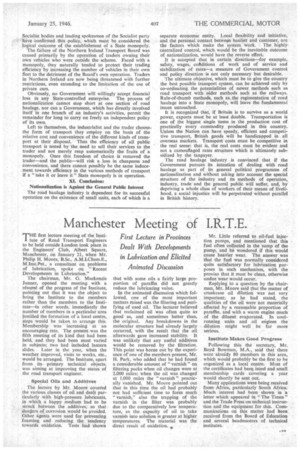Manchester Meeting of I.R.T.E.
Page 43

If you've noticed an error in this article please click here to report it so we can fix it.
First Lecture in Provinces Dealt With Developments in Lubrication and Elicited Animated Discussion
THE first lecture meeting of the Insti,tute of Road Transport Engineers to be held outside London took place in the Engineers' Club, Albert Square, Manchester, on January 21, when Mr. Philip H. Moore, B.Sc., A.M.I.Chem.E., M.Inst.Pet., a 'consultant on problems of lubrication, spoke on "Recent Developments in Lubrication."
The chairman, Mr. G. Mackenzie Junner, opened the meeting with a resume of the progress of the Institute, pointing out that it was the object to bring the Institute to the members rather than the members to the Institute—in other words, immediately the number of members in a particular area justified the formation of a local centre, steps would be taken to arrange this. Membership was increasing at an encouraging rate. The present was the fifth meeting of its kind that had been held, and they had been most varied in subjects; two had included lantern slides. Later in the year, when the weather improved, visits to works, etc., would be arranged. The Institute, apart from its primary technical objects, was aiming at improving the status of the road transport engineer.
Special Oils and Additives . The lecture by Mr. Moore covered the various classes of oil and dealt particularly with high-pressure lubricants, in which a happy medium had to be struck between the additives, so that dangers of corrosion would be avoided. Other agents were used for preventing foaming and reducing the tendency towards oxidation. Tests had 'shown that with some oils a fairly large proportion of paraffin did not greatly reduce the lubricating value.
In the animated discussion which followed, one of the mOst important matters raised was the filtering and purifying of used oil. The lecturer believed that reclaimed oil was often quite as good as, and sometimes better than, the original. Any breakdowns in the molecular structure had already largely occurred, with the result that the oil afterwards gave increased stability. It was unlikely that any useful additives would be removed by the filtration. This point was borne out by the experience of one of the members present, Mr. H. Park, who added that he had found a considerable amount of "varnish" on filtering packs. when oil changes were at 2,000 miles; when the oil was changed at 1,000 miles the "varnish" practically vanished. Mr. Moore pointed out that in this time the oil had probably not had sufficient time to form much "varnish," also the trapping of the varnish in the filter was probably due to the comparatively low temperature, as the capacity of oil to take varnish into solution is greater at higher temperatures. The material was the direct result of oxidation. •
Mr. Little referred to oil-fuel injection pumps, and mentioned that this fuel often collected in the 'sump of the pump, and he wondered if this would cause heavier wear. The answer was that the fuel was normally considered quite satisfactory for lubrication purposes in such mechanism, with the proviso that it must be clean, otherwise undue wear would occur.
Replying to a question by the chairman, Mr. Moore said that the matter of crankcase oil dilution was not very important; as he had stated, the qualities of the oil were not materially affected by a reasonable proportion of paraffin, and with a warm engine much of the diluent evaporated. In coolrunning units and oil engines the dilution might well be far more serious.
Institute Makes Good Progress
Following this the secretary, Mr. Boyd Bowman, M.A., said that there were •alreidy go members in this area, which would probably be the first to be organized as a local centre. Most of the certificates had been istied and small membership cards covering a year would shortly be sent out.
Many applications were being received from Africa, particularly South Africa. Much interest had been shown in a letter which appeared in "The Times" and the Trade Press on technical instrue. tion and the equipment for this. Communications On this matter had been received from the Board of Education and several headmasters of technical institutes.




























































